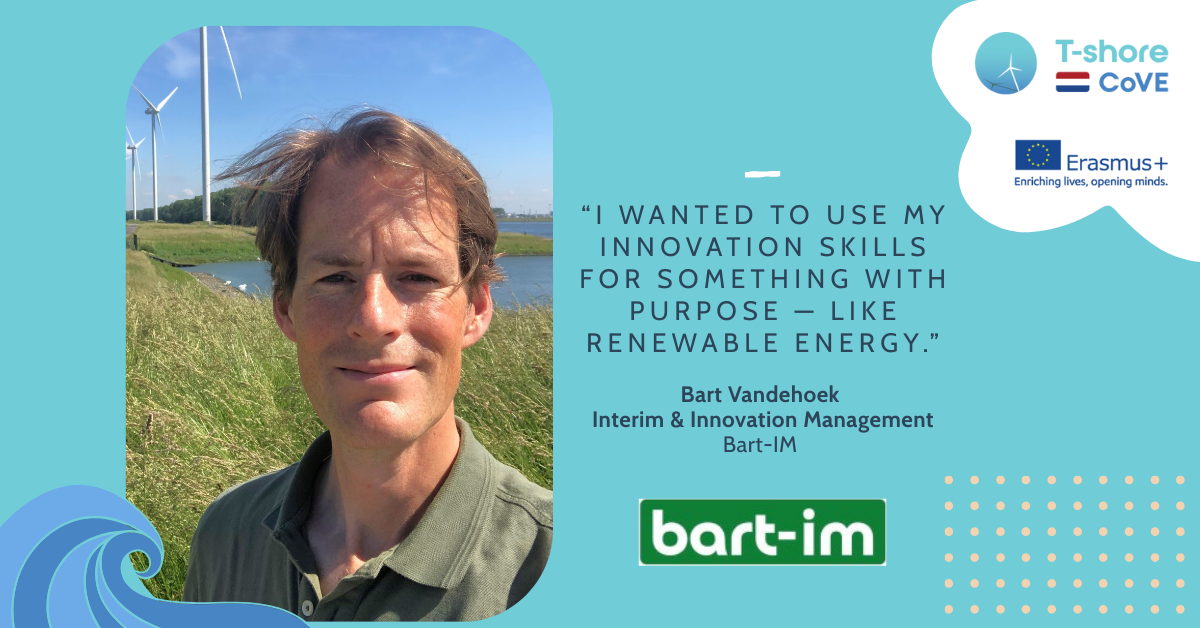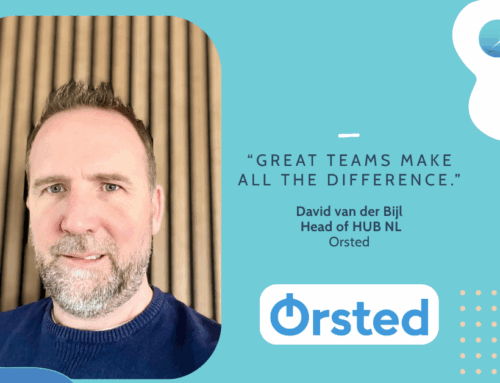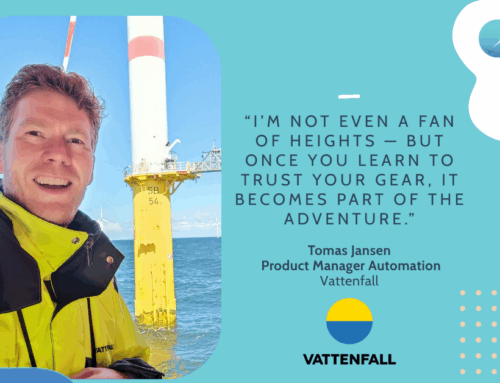Bart Vandehoek’s journey into offshore wind didn’t begin in the energy sector — it began with coffee machines and product packaging. With a background in industrial design and years of experience in innovation, Bart decided at 40 to use his skills for something with greater purpose: renewable energy.
He now works independently across Europe on automating wind turbine inspections and repairs, using tools like drones, robotics, and smart platforms. In this interview, Bart talks about his shift into the sector, the challenges of driving innovation in a risk-averse environment, and the milestones that have helped streamline and modernise maintenance processes.
From climbing turbines to calling for new test facilities, Bart shares practical insights and thoughtful advice for anyone looking to join — or improve — the offshore wind industry.
Full Interview:
From Consumer Products to Offshore Wind: An Inspiring Journey
Background & Inspiration
With a background in industrial design from TU Delft, Bart Vandehoek initially worked on consumer products, from coffee machines to packaging development at Unilever. However, at 40, he realized he wanted to make a more meaningful impact. “I wanted to use my innovation skills for something with purpose, like renewable energy.” That realization led him to the offshore wind industry.
Career Path
Bart transitioned to Eneco, specializing in wind turbine blade maintenance. His expertise in innovation and project management took him to Vattenfall, where he now works as an independent consultant on automating inspection and repair processes using drones and robotics. “It’s a challenging field, but the opportunity to contribute to the energy transition makes it worthwhile.”
Challenges & Highlights
The offshore wind sector is evolving, but it comes with hurdles. “The industry’s risk-averse nature can slow down innovation. We need to balance safety and progress.” Yet, there are achievements: Bart helped digitize inspection data, making maintenance decisions more efficient and effective. “That was a milestone, but there’s still so much potential.”
Another achievement was implementing a software platform that streamlined damage assessments and repairs. “Previously, repair reports were done manually and took weeks to process. Now, technicians can input data directly into an app, making everything faster and more transparent.”
Daily Work & Surprises
As a project and innovation manager, Bart’s work varies between home office meetings and field visits. “A lot of my work involves coordinating international teams via Teams meetings, but I also travel to Denmark and testing locations. Sometimes, I even get to climb wind turbines myself, which I didn’t expect but really enjoy.”
A major challenge he faces is the lack of dedicated test turbines in Europe. “Having specialized test sites would greatly accelerate the adoption of new technologies like drones and robots for maintenance
Advice for Future Professionals
For those considering a career in offshore wind, Bart has one key piece of advice: “Master a skill before becoming a generalist. Whether you work in maintenance, innovation, or project management, make sure you truly understand one aspect first. That foundation will serve you well.”
He also sees great value in learning from other industries, such as offshore oil and gas, to enhance safety and efficiency in wind energy. “We should embrace cross-sector collaboration to bring in fresh perspectives and expertise.”
Future Vision & Innovation
Bart believes offshore wind will play an increasingly vital role in the energy transition. “We’re just at the beginning of what’s possible. Automation in maintenance and inspection will reduce costs and safety risks significantly.”
He advocates for more hands-on training facilities to attract new talent. “We need real wind turbine sites where students, companies, and researchers can collaborate on innovation. That would be a game changer.”
Relaxation & Inspiration
After a challenging day, Bart unwinds by running or cooking. His career has been shaped by advice from his first boss: “Don’t ask for permission, ask for forgiveness later.” This mindset keeps him proactive and innovative in a constantly evolving industry.
Bart Vandehoek’s story highlights the value of cross-sector experience, practical innovation, and a hands-on approach to shaping the offshore wind industry. His journey from product design to turbine inspection underscores the wide range of skills needed as the sector continues to grow. As offshore wind evolves, stories like Bart’s show how technical expertise and forward-thinking collaboration can help build a safer, more efficient future for renewable energy.









